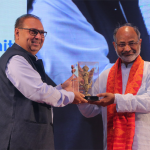The 10th Edition of the TATA Social Enterprise Challenge pulled its curtains in style with the Social Entrepreneurship Summit held in the IIM Calcutta campus
The 10th Edition of the TATA Social Enterprise Challenge pulled its curtains in style with the Social Entrepreneurship Summit held in the IIM Calcutta campus on July 2, 2022.
Apart from declaring the winners of TSEC 2021-22, the SE Summit also continued with the tradition of hosting the who’s who from the development space and deliberating over some key aspects concerning social entrepreneurship.
The TSEC SE Summit 2021-22 was graced by Peeyush Gupta, Vice President (Supply Chain) – TATA Steel, and Board Chairman – Tata Steel (Thailand) PLC., Jamipol Ltd., TM International Logistics Ltd., Creative Port Development Pvt. Ltd. and Subarnarekha Port Pvt. Ltd., as a Chief Guest.
The Summit was also attended by several distinguished social entrepreneurs and industry figures like Ved Arya, Founder & Director, The Buddha Institute; Pranshu Singhal, Founder, Karo Sambahv and Social Entrepreneur of the year 2021; and Prof Manish Thakur, Dean New Initiatives & External Relations, IIM Calcutta.
Following an inaugural address by Prof Manish Thakur, the CEO of IIM Calcutta Innovation Park, Dr. Subhrangshu Sanyal, introduced the theme for the TSEC Summit 2021-22 – “Leaping Forward and Fostering Resilience.”
The highlight of the Summit was a special panel discussion on this year’s theme. The panel comprised of four dynamic startup founders, viz., Jahan Peston James, Founder, BOHECO; Ambika Satapathy, Co-Founder, FreshR; Satendrasingh Lilhare, Founder Bastar Se Bazar Tak, and Saurabh Ray, Founder Monosha Biotech. The eye opening discussion was moderated by Prof Chandradeep Mitra, Founder and CEO, PipalMajik, and Mentor, IIM Calcutta Innovation Park.
The 10th Edition of TATA Social Enterprise Challenge received a record breaking 6600 applications. 110 applications were shortlisted for the regional rounds. These applications covered areas such as agriculture, healthcare, water and sanitation, technology and development, education and skills development, housing, handicrafts, energy and microfinance, among others. Based on the business plan presentations, 22 social enterprises were selected for the semi-finals and eventually 12 enterprises made it to the finals.


